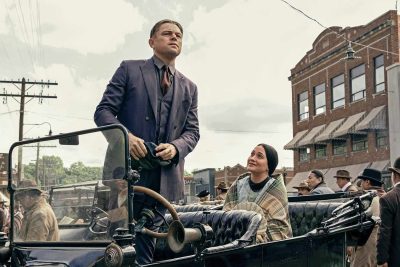

It may be shallow, but I have a hard time with a movie being 3 ½ hours long. These are the days of prestige television…if you have that much to say, make a limited series, don’t ask an audience to sit for that long in a movie theater. At the very least, you are begging for your movie to be watched at home, where bathroom breaks can be baked in. But, if you are legendary director Martin Scorsese, studios will let you do anything, apparently. Scorsese’s last two films, The Irishman and Killers of the Flower Moon, have a combined runtime of 7 hours. SEVEN HOURS for two films. Come on.
I hated The Irishman. I love Scorsese, but that film felt bloated and pointless to me, so I was naturally hoping his new film, Killers of the Flower Moon, despite the same 3 ½ runtime, would be much better.
It’s not.
Killers of the Flower Moon has a fascinating premise: an examination of the sociopolitical landscape of 1920’s Oklahoma, where oil-rich Osage Nation tribal lands and people were exploited by white men intent on stealing everything out from under them, even if it meant murdering the Osage, one by one. Even though the FBI launches an investigation into the killings, the roots of distrust and hate run too deep for any simple solutions.
Killers of the Flower Moon is a deeply political and ethical commentary on society and humanity’s treatment of one another, but it also had such great potential to shine a light on a captivating period of American history, specifically that of the indigenous people of this land. Instead, the film wanders in and out of individual stories, lingering way too long in some spots, glossing over others with barely a passing interest. It’s designed, I suppose, to allow the audience to really sit in the setting, to live in the atmosphere and feel what it was like to be in that moment in time, with all the rich detail, but it all becomes tedious when the plot fails to advance and we’re just left to simmer in the sadness.
Lily Gladstone, who plays an Osage woman who marries an ambitious man just back from the war, played by Leonardo DiCaprio, is a breath of fresh air, the only one in this film that breaks from the plodding seen-it-all-before vibe, as her performance is quiet and powerful, steeped in pride, courage and strength. But the screenplay fails her, as her high-potential character is reduced to a footnote in an overly sprawling tale that, inevitably, ends up focused on the white people anyway.
